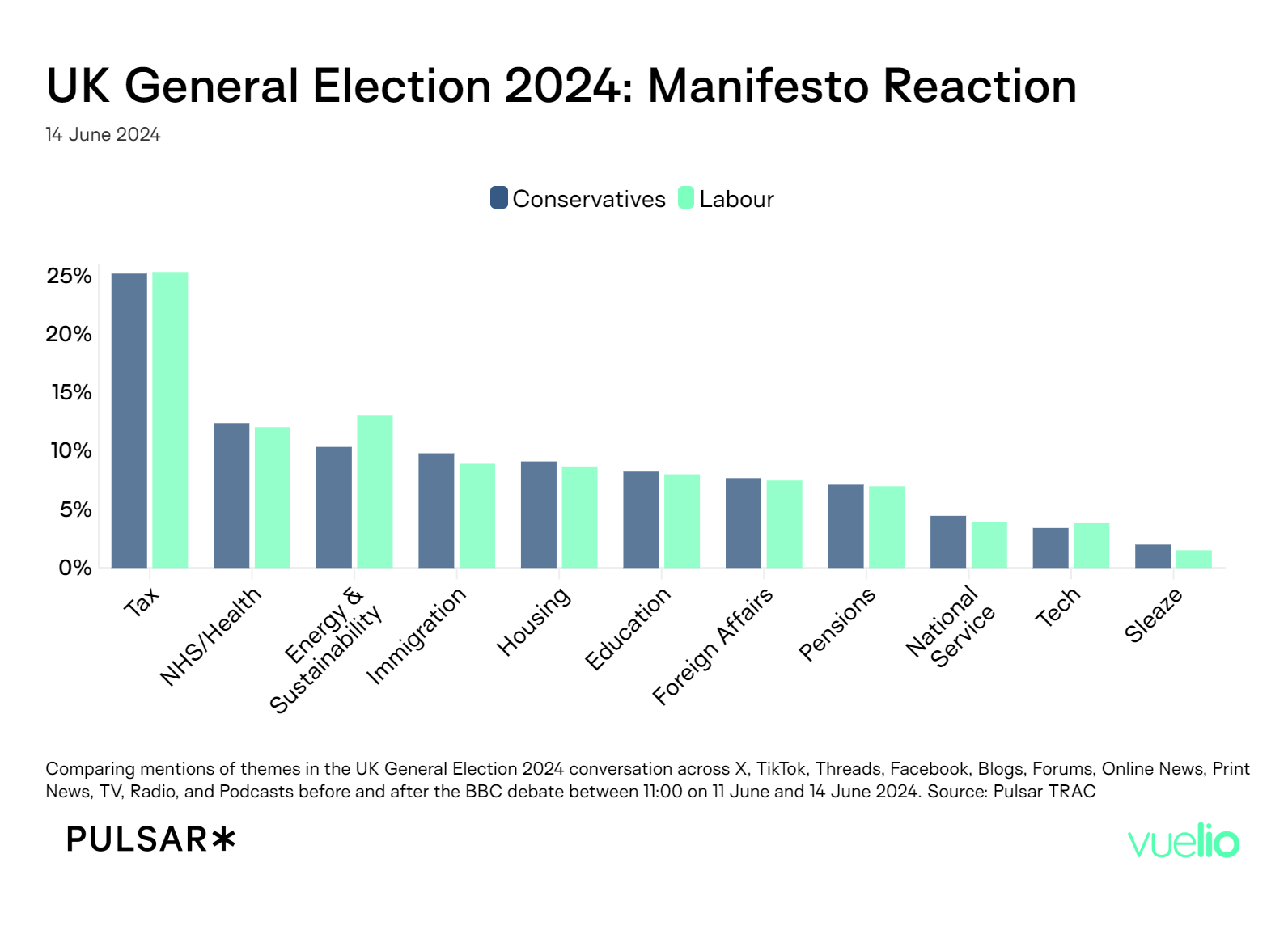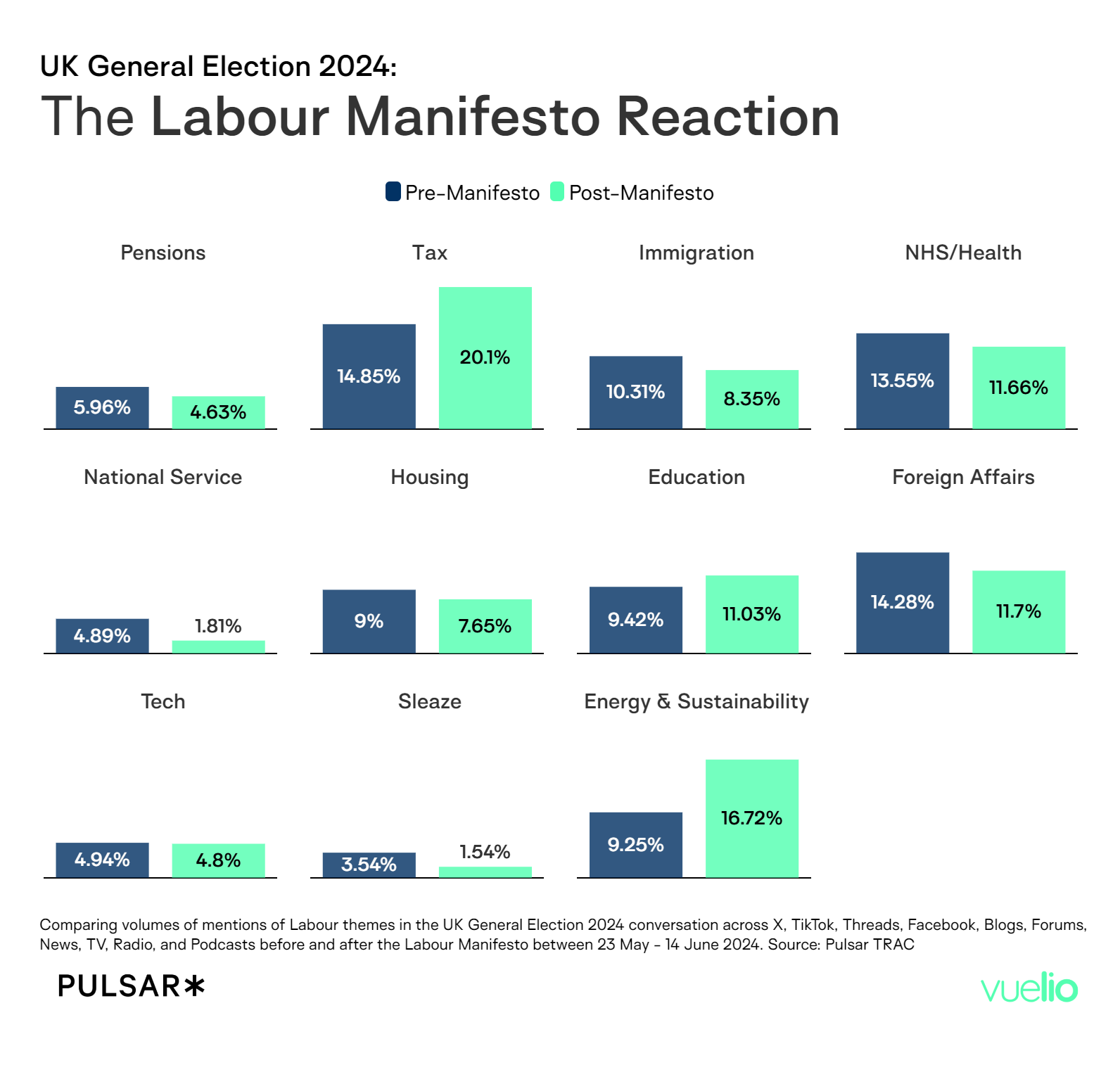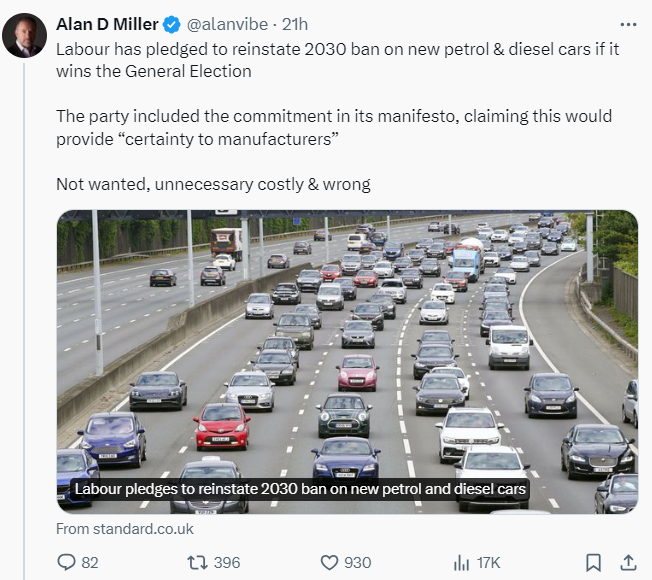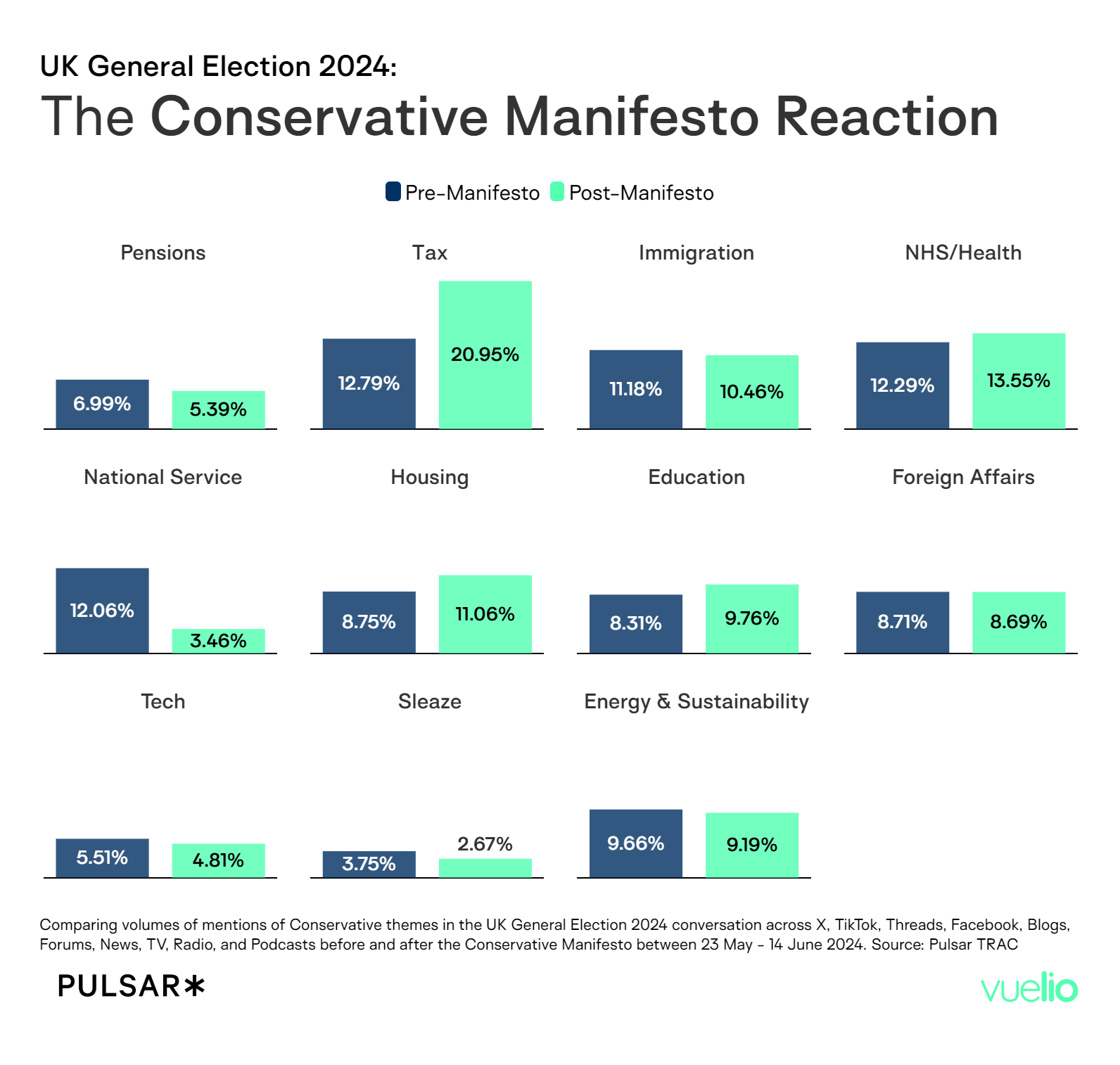Ambition, ‘bad ideas’, and pushes to be ‘bolder’: General Election 2024 manifesto reactions among audiences and the media
By Phoebe-Jane Boyd, Dahye Lee, and Ingrid Marin.
This week represented the midpoint of the General Election campaign and it was a pivotal moment for all parties to pitch to voters.
Manifestos from the main parties were released throughout the week – with the exclusion of Reform UK, due to come on Monday 17 June.
To understand how the releases impacted press coverage and online discussion, here is analysis of the UK General Election 2024 conversation across online and print news, TV, radio, and podcasts as well as TikTok, Threads, Facebook, blogs, and forums, from 11 – 14 June, as well as a deep dive into political stakeholder reaction as the week progressed.
First, a look at the big two – the incumbent Conservatives, and the party expected by many to oust them come 4 July, Labour.
Manifesto coverage and conversation – Conservatives vs Labour

Following the passionate clashes during the ITV and BBC debates between Conservative and Labour, the main impact of their manifestos is focused on tax.
Conversation has risen around this topic following Labour’s manifesto pledge to increase taxes, in a potential boost to the Tories.
Did Labour’s manifesto make an impact?

As to whether Labour’s manifesto has changed reporting and social media discussion around its policies and promises, analysis of the pre- and post- release shows an impact on the topics of tax (+5.3%) and energy policy (+7.5%).
The increase in coverage and discussion of tax is driven by diverse news narratives surrounding Labour’s related policies. The highest engagement is for ITV‘s focus on Labour’s tax lock, while GBNews highlights voter concerns about Labour’s proposed tax increases.
Why the spike for energy? Labour’s pledge to ban new petrol and diesel cars and ensure ‘certainty to manufacturers’ in energy and sustainability has prompted Conservative communities to generate criticism.

Did the Conservative manifesto make a difference?

The Conservative manifesto also made an impact on Tax (+8.2%), alongside Housing (+2.3%).
BBC’s coverage of Keir Starmer’s condemnations of Sunak’s National Insurance cuts dominates the tax narrative, as the Tory campaign becomes increasingly embattled. Over on social media, the proposal to scrap National Insurance for the self-employed is provoking negative reaction due to perceived unfairness.
Unsurprisingly, Nigel Farage is enmeshed in discussion of Conservative chances at the election, as the Reform UK leader criticises policies as they are announced – this week’s manifesto included. Gaining traction online now – his comment that a Conservative promise regarding its Rwanda Bill was ‘another lie’.
Political stakeholder reaction – a look back at the week
Monday: Liberal Democrats got ambitious
The week began with the Liberal Democrats releasing their party manifesto. They pledged a £8.35bn NHS and care package – funded by reversing tax cuts for banks and closing tax loopholes – and set out long-term plans for rejoining the EU.
Nuffield Trust Chief Executive Thea Stein responded to the manifesto, calling it highly ambitious. However, she also said the funding proposed appeared ‘insufficient’, and that the sums ‘simply don’t add up’. Additionally, IFS Director Paul Johnson said that the tax measures would not raise the £27bn a year that the party claims, and that some of the tax raising proposals are, economically, a ‘bad idea’.
Tuesday: Conservatives sparked questions regarding costings
Questions about how proposals will be paid for were also raised on Tuesday when the Conservatives released their manifesto and pledged to cut taxes (including entirely scrapping the main rate of self-employed National Insurance) and introduce a new Help to Buy scheme by abolishing stamp duty for first-time buyers (on homes up to £425,000).
Paul Johnson from the Institute for Fiscal Studies said that the manifesto promised £17bn a year of tax cuts, alongside a big hike in defence spending, and questioned how this would be paid for. The Conservatives suggest they will fund some of their commitments by cutting the rising welfare bill, but Johnson questions how achievable this is.
Similarly, Labour leader Keir Starmer said it was a ‘Jeremy Corbyn-style manifesto’, suggesting the Conservatives had not explained how they would pay for their policies. He promised that Labour’s manifesto would be ‘fully costed’ and would only include ‘promises that we can keep and that […] the country can afford’.
Wednesday: Green Party pushed Labour to be bolder
Wednesday marked the release of the Green Party manifesto, pledging to raise taxes on the wealthy to fund more spending on housing, the NHS, and the climate crisis.
The manifesto includes the introduction of a wealth tax and a raising of National Insurance on annual wages above £50,270. Focusing on the four seats which the party believes are winnable, the co-leaders Carla Denyer and Adrian Ramsay said electing Green MPs would ‘push Labour to be bolder’, particularly on net-zero climate change policies, which they accused other parties of ‘running away from’.
Thursday: Was Labour too cautious?
On Thursday, Keir Starmer launched the Labour party’s manifesto, where he pledged to prioritise ‘wealth creation’. As commentators expected, the document was relatively light on policy detail, and didn’t contain any big surprises.
Some commentators have suggested that Labour’s spending plans are more cautious than the Conservatives and the Liberal Democrats. If Labour are firmly committed to not raising taxes, this does raise questions about how they would be able to avoid cuts to public services.
Former Shadow Chancellor Ed Balls warned the manifesto could be a ‘straitjacket’, and make the first year of a Labour Government very difficult. Senior Labour figures have responded to such criticisms by saying they would deliver growth, and therefore expand the total revenue available for public services without having to raise taxes.
Still to come: Reform UK
Ahead of the Reform UK manifesto being released on Monday 17 June, a poll found that Reform UK had overtaken the Conservatives for the first time. Farage has said his party ‘are now the opposition to Labour’, and that a Tory vote would only ‘enable’ Starmer’s party.
Whether the release of Reform manifesto adds solidity and credibility to their challenge, or else sees their recent progress melt away, is something that will be closely monitored by politics watchers.
For regular updates on what is happening in UK politics and public affairs, sign up to our weekly Point of Order newsletter, going out every Friday morning.





Leave a Comment